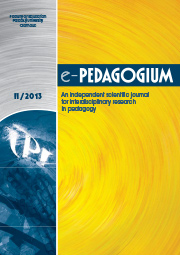e-Pedagogium 2017, 17(3):7-26 | DOI: 10.5507/epd.2017.032
Čo sú sociálne vedy, nejednoznačnosť a veľká variabilita významu pojmu sociálno II
- prof. PhDr. Peter Ondrejkovič, DrSc., Ústav pedagogiky a sociálních studií, Pedagogická fakulta Univerzity Palackého v Olomouci, Žižkovo nám. 5, 771 40 Olomouc, E-mail: peter.ondrejkovic@upol.cz
Či vôbec možno hovoriť o vede mimo prírodných vied, vychádza z prekonaného klasického poňatia vedy, založené na newtonovskom a karteziánskom modelom vedy. Sociálne vedy predstavujú aj prekonané poňatie vedy, vybudované metódou rozčleňovania na časti a ich skladania v zhode so zákonmi klasickej príčinnosti, ktorá utvárala striktne deterministický obraz sveta. Klasické predstavy o prísne deterministických zákonoch ustupujú a javia sa ako zložitá sieť vzťahov medzi rozličnými časťami sociálnej skutočnosti. Tá pozostáva nie iba z racionálne konajúcich bytostí a nemožno ju pochopiť, podobne ako i spoločnosť, iba prostredníctvom logickej úvahy, zredukovaním na to, čo je pozorovateľné a merateľné. Sociálne javy, ktoré sú predmetom skúmania sú obsahom sociálnych vied, ktoré pracuje "vo svete významností". Sociálne vedy sú tak interpretáciou štruktúry sociálneho systému, sústavy zákonov a pôsobenia merateľných (aj materiálnych) síl, ako aj sieťou významov, praktík a pravidiel. S sociálnych vedách sa nemôžu používať metódy, ktoré sú natoľko exaktné ako v prírodných vedách. Sociálne vedy však majú komplementárny charakter s ostatnými vedami a tvoria jednotu ľudského poznania.
Klíčová slova: sociálno, sociálne javy, poňatie vedy, prírodné a sociálne vedy, metódy, Bayesianizmus, kvantitatívny a kvalitatívny prístup, interpretatívne orientovaný postup, porozumenie
What are the social sciences, ambiguity and large variability meaning of the term social II
The question if it is at all possible to speak about science also outside the scope of the natural sciences arises from an outdated classic conception of science based on the Newtonian and Cartesian model. Social sciences also represent an outdated conception of science created by division and unification of separate parts in accordance with the laws of classic causality which formed the deterministic world view. The classic conception of strictly deterministic laws recedes and appears to be a complex web of relationships between various parts of the social reality. The social reality does not consist solely of rationally acting beings, thus it is not possible to understand the social reality and society only by means of logical reasoning and reducing things into what is measurable and observable. The studied social phenomena belong to the scope of social sciences which operate in the "world of significance". Thus, the social sciences represent an interpretation of the social structure, system of laws and influence of measurable (also material) forces, as well as a network of meanings, practices and rules. For social sciences it is not possible to use as exact methods as in the natural sciences. However, the nature of social sciences is complementary to other sciences and together they form the unity of human knowledge.
Keywords: social, social phenomena, the concept of science, natural and social sciences, methods, Bayesianism, quantitative and qualitative approach, interpretative process, understanding
Zveřejněno: 1. září 2017 Zobrazit citaci
Reference
- Alijevová, D. (1985). Súčasná americká sociológia, Bratislava: Pravda.
- Ballantine, J. H. (1989). The Sociology of Education: A systematic Analysis. Engelwood Cliffs (New Jersey): Prentice-Hall 1989.
- Balon, J. (2007). Sociologická teorie. Praha: Slon.
- Berger, P. L., Luckmann, T. (1991). The Social Construktion of Reality. The Treatise in the Sociology of Knowledge. London: Penguin Books.
- Bohnsack, R. (1999). Rekonstruktive Sozialforschung. Opladen: Laske u. Budrich.
- Bohr, N. (1928). The Quantum Postulate and the Recent Development of Atomic Theory. Nature, April 14, 1928, pp. 580-590. [on-line] Dostupné na: http://www.informationphilosopher.com/solutions/scientists/bohr/quantum_postulate.html
 Přejít k původnímu zdroji...
Přejít k původnímu zdroji... - Buraj, I. (2000). Foucault a moc. Bratislava: UK.
- Campbell, D., Fiske, D. (1959). Convergant and discriminant Validation by the Multitrait - Multimethod-Matrix. Psychological Bulletin, 56, pp. 81-105.
 Přejít k původnímu zdroji...
Přejít k původnímu zdroji... - Cicourel, A. V. (1970). Methode und Messung in der Soziologie. Frankfurt am Main: Suhrkamp 1970, orig. Method and Measurement in Sociology, Glencoe 1964.
- Cox, David Roxbee, Hilton David Miller (1994) The theory of stochastic processes. London: Chapman and Hall/CRC.
- Černík, V., Viceník, J., Višňovský, E. (1997). Historické typy racionality. Bratislava: Iris.
- Denzin, N. K., Lincoln Y. S. (1995). Collecting and Interpreting Qualitative Materials. London: Sage.
- Denzin, N. K. (1978). The Research Act: A theoretical introduction to sociological methods. New York, N.Y.: McGraw-Hill, 2nd Edition.
- Douglas, J. D. (ed.) (1970). Understanding Everyday Life, Chicago: Aldine.
- Durkheim, É. (1956). Education and Sociology. Glencoe (Illinois): The Free Press 55.
- Foucault, M. (1969). L' archéologie du savoir. Paris: Gallimard.
- Friedmanová, M. (2005): Paul Ricoeur: Problém interpretácie a porozumenia. Filozofia, 60(3) s. 192-197.
- Gadamer, H. G. (1990). Wahrheit und Methode, Grundzüge einer philosophischen Hermeneutik. Tübingen: Mohr 1990, 1. vyd. 1960.
- Garfinkel, H. (1973). Das Alltagswissen über soziale und innerhalb sozialer Strukturen. In Arbeitsgruppe Bielefelder Soziologen (Hrsg.). Alltagswissen, Interaktion und gesellschaftliche Wirklichkeit. Reinbek bei Hamburg: Rowolt 1973, pp. 189-260.
 Přejít k původnímu zdroji...
Přejít k původnímu zdroji... - Girtler, R. (1980). Polizei-Alltag, Opladen: Lask.
- Girtler, R. (1984). Methoden der qualitativen Sozialforschung. Anleitung zur Feldarbeit, Wien, Köln, Graz: Böhlau.
- Glaser, B. G. und Strauss, A. L. (1979). Die Entdeckung gegenstandsbezogener Teorie: Eine Grundstrategie qualitativer Sozialforschung. In Hopf, Ch. & Weingarten, E. (Hrsg.): Qualitative Sozialforschung, S. 91-111, Stuttgart: Klett Verlag.
- Habermas, J. (1981). Theorie des Kommunikativen Handelns. Band I., Band II. Handlungsrationalität und gesellschaftliche Rationalisierung. Frankfurt am Main: Suhrkamp
- Harré, R., Gollet, G. R. (2001). Diskurz a myseľ, Bratislava: Iris.
- Heidegger, M. (1996). Bytí a čas. Praha: OIKOYMENH.
- Heisenberg, W. (1969). Der Teil und das Ganze. München: R. Piper & Co. Verlag (1969).
- Hirner, A. (1976). Ako sociologicky analyzovať. Bratislava: Ústav školských informácií.
- Hubík, S. (1999). Sociologie vědění. Praha: Slon.
- Kirk, J., & Miller, M. L. (1991). Reliability and validity in qualitative research. London
Tento článek je publikován v režimu tzv. otevřeného přístupu k vědeckým informacím (Open Access), který je distribuován pod licencí Creative Commons Attribution-NonCommercial-ShareAlike 4.0 International License (CC BY-NC-SA 4.0), která umožňuje nekomerční distribuci, reprodukci a změny, pokud je původní dílo řádně ocitováno. Není povolena distribuce, reprodukce nebo změna, která není v souladu s podmínkami této licence.






